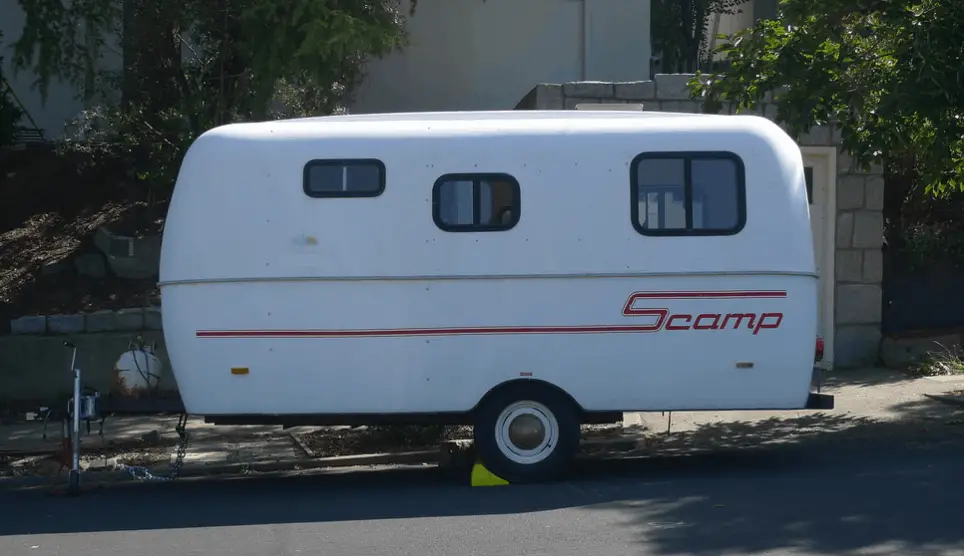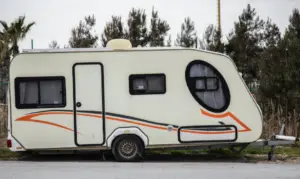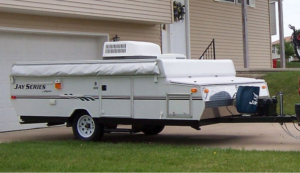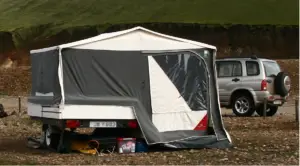Travel trailer tires are much more critical and should be inflated at right PSI.
But, how do you know the right PSI? We will find out, read on!
Replacing the tires when the thread is gone or when it blows out will cost you few hundred dollars. Inflating the tires to right PSI will enhance the tires life.
Thus, always inflate the travel trailer tires to the right PSI.
What PSI for travel trailer tires
Inflating the tires to correct psi is critical in keeping them in good conditions. So, what’s the correct pressure for travel trailer tires?
No, there isn’t a same answer for all travel trailers. It depends on your travel trailer and the tire.
Ideally, you should set the travel trailer tire pressure to what the sticker inside your rig or the manual mentions unless you changed the original tires with different load capacity. The PSI mentioned on the sidewall of tires is the maximum cold pressure.
The PSI mentioned on the tire sidewall is the maximum pressure it can be set to but you don’t really have to set it to that level unless required.
Setting correct PSI based on your RVs load is critical. Too little pressure can result in sidewall flex resulting in heating which is a common cause of blowouts. Too much tire PSI can result in loosing traction of the travel trailer.
Each travel trailer has maximum weight carrying capacity and on the basis of that, the psi will be specified for the tires. You will normally find the label somewhere inside the travel trailer mentioning the psi that need to be set for the tires.
Apart from the label inside the trailer, a standard sidewall ratings would be present on the trailer tire. If the the tire came along with the new trailer, then at both the places the psi would be same or almost similar with slight difference. When that is the case, its straight forward for you. Just maintain that psi in the tires.
Adding tire pressure monitoring system like this one by EEZ RV is a great investment. Its a multi purpose system that also has anti theft sensors. Its an advanced alert system for your RV that comes with 3 year warranty. It continuously monitors the tire pressure/temperature every 6 seconds.

At times, the label could be missing inside the trailer. You need to contact the dealer for that information or it could be mentioned on the manual as well.
So, what the average psi looks like?
For most travel trailers, the tire pressure is mostly between 40 psi to 65 psi. Remember, this is not what you have to set, its what the average numbers look like. That is, most travel trailer tires will be inflated with PSI falling in this range.
This range is depended on the weight of the trailers as most of the trailer weigh in between 1500 lbs to 15,000 lbs, hence the psi range.
Above point is very critical.
Do not set tire pressure for your trailer tires looking at your neighbor’s travel trailer. Two trailers will always be different, and will have different GAWR (gross axle weight rating) and GVWR (gross vehicle weight rating).
Its simple as that. The only way to find out whats the correct pressure is to look at the ratings mentioned by you manufacturer. In case you do not find those ratings then get your RV weighed and take professional expert advice to figure put the tire pressure.
Finding the right PSI
So, the trailer you have is an old one and its time to replace the tires on it. The label on the trailer has a different psi and the tires you bought are showing psi that’s different.
Now, one thing you should be doing is don’t get tires that has psi lesser than the one mentioned on trailer.
- The trailer manufacturer gives you psi for tires that will be required to carry the trailer weight and any lower pressure would mean the tire wont be in position to take that load. Hence, the psi on your tires shouldn’t be lower than that.
What about higher psi? That happens a lot many times with people. Normally, when you buy a trailer, the tires that are given are just good enough to handle the weight of the travel trailer. Later when you a buy a new tire, that could be rated for higher psi.
So, what do you do in that case? Do you go for the psi mentioned on tires or the lower psi mentioned on the RV manual?
The RV manual or label mentions the psi needed to carry the maximum weight of the travel trailer where as the tires have rating of psi which it can carry max.
So, its better to go for psi mentioned on the tire. This however does not mean that the weight carrying capacity of the trailer would increase. With the higher psi of tires, the trailer may not ride ideal though.
Its also okay to get the psi reduced to what the trailer mentions. It all depends on the psi and the weight being carried. Make sure the psi should not be less than what the RV manual or label mentions though. A lower psi will heat the tires ad result in blowout.
Similarly, setting up higher psi than what the tires are rated for will lead to loosing traction.
Replacing the trailer tires
Normally, a trailer tire would last more around 4-6 years or even beyond.
When you are about to replace the tires, make sure you buy the tires that are of same load capacity.
Having the same capacity is necessary as the trailer would also have many other elements or components that would be designed for that load. This also helps in avoiding the confusion of setting up psi.
When you have same psi written on tires and also on trailer manual, go ahead with that pressure. At times, the psi can be set a little higher to about +5 but not more than 10. Doing that should be avoided. As always do not set the psi lesser than what is mentioned when you don’t go with full load on trailer.
RV professionals or tire experts can also help you through trailer tire pressure charts or trailer tire size charts. But, if you know what tires were originally given for the trailer then go for same brand and rating.
Overloading the trailer
This is one factor that can lead to tire blow out or reducing the tires life over the period of time. Make sure you do not overload the trailer as this will mean your trailer tires wont be able to handle the weight.
The tires are rated for max weight of the trailer. Going beyond that weight limit will mean the psi set in tires wont be capable of handling the weight.
Overloading the trailer not only puts you, your car and trailer in threat but also others on road. A overloaded trailer can slide and turn over, it can collide with other vehicles as well.
Weighing your travel trailer regularly can help you in planning. Not many of us weigh the rv’s regularly and thus we tend to overload the trailer unknowingly. But, that’s not a good practice.
Not inflating the tires correctly
Not setting the tire pressure upto the number listed on the tires or trailer will result in reducing the weight carrying capacity of the tires on trailer.
Under Inflation
The trailer tires need to be inflated enough to handle the top load from the trailer, their sidewalls are designed so. But, with less than specified psi, the tire sidewalls will start generating excessive heat and result in failure.
Over inflating
Similarly, over-inflating the tires of trailer can also result in failures. This leads to wearing out of the tires in the center. But, the end result is same. Thus its extremely important that you inflate the tires correctly.
Another thing to note, as the trailer moves it will heat the tires and the psi may read higher. So, the bets practice is to check the tire pressure when its cold. Early in the morning when you haven’t taken it road is a good time to do this activity.
Its always a good practice to check the tire pressure before making a long travel. Make sure you do this during morning time as the tires will be cold and thus give accurate psi.
What tires for trailer
Buying a tire for a car and buying it for trailer is completely different. Tires for trailers are specially designed and you would see text “ST” written on their sidewalls. ST stands for special trailers, they have strong sidewalls. And, this makes them good enough to handle the vertical load.
Different companies like goodyear, michelin and many other make quality tires for travel trailer. Selecting the right tire is critical and hence check twice before buying a new one for your trailer or even fifth wheel.
Apart from proper inflation
While maintaining the tire pressure is the most important aspect of keeping trailer tire good. Lets, check on other pointer to be given similar attention. This tips will definitely help in increasing the life of trailer tires.
1. Check sidewalls
Before you start that camping travel make sure to check the tire sidewalls. Identify cracks or breaks before you go on road. Its important that you have perfectly fit tires and not take any chance whatsoever. Doing such inspection should be in your travel checklist.
People often overuse their tires on RV’s or camper. Replacing tires on time should be your priority. Normally, the tires go out of use in around 4-5 years and thus keeping track of them is necessary. Also, at times you may not be able to make out if the tire is still good or not. In such cases take the trailer to a professional and get the tires inspected.
Remember, a blow out in the middle of road is more dangerous and is also costly. A trailer that fails on the middle of road need to be towed to a repairer. And that can be costly and tedious job. You surely don’t want that to happen to you.
2. Extra weight on trailer
Maintaining pressure as per the laid out value is necessary to support the weight while towing a trailer. The manufacturer gives the psi value for max pressure that trailer handle.
Exceeding the stipulated weight will mean the tires wont be able to tackle the weight. And this can result in anything. Remember, even few pounds of extra weight can lead to incidents. Make sure you weigh the trailer properly and keep the weight within limits.
When going out for long travel we often pack unnecessary items. This leads to weight that goes out of the limit. Keeping a proper checklist and avoiding elements that are not needed can help in checking the weight.
3. Tire care during storage
While the travel trailer camper is in storage, there is good chance of damage too. Make sure the tires are protected well. You can make use of tire covers for this. Also keeping the tires above ground can help relive pressure on them.
Keeping them without covers will also affect the tires due to UV radiation and or moisture. Also, during winter times its necessary that the whole trailer is well stored else you may have hard time getting it out next season.
Similar care is also needed in other towable RV’s like pop up camper or tent trailer as well as in motorhomes like class C RV or class A. RVs need special storage during winters.
4. Replace on time
Getting the tire replaced on time is necessary. With limited life, you better replace them before a blowout happens. Else, the impact could be worse. Doing period checks on sidewalls, checking for wear and tear can help a lot in deciding.
A scheduled maintenance of the trailer can take care of this aspect. Also, make sure you put tires that have same rating and capacity. Many a times you get tires that aren’t the same and that creates confusion about psi as well.
Its better to go for tires that manufacturer recommends. Whether you have a jayco or a airstream travel trailer or a winnebago RV, its all similar for all, you need to take good care and replace the tires on time.





